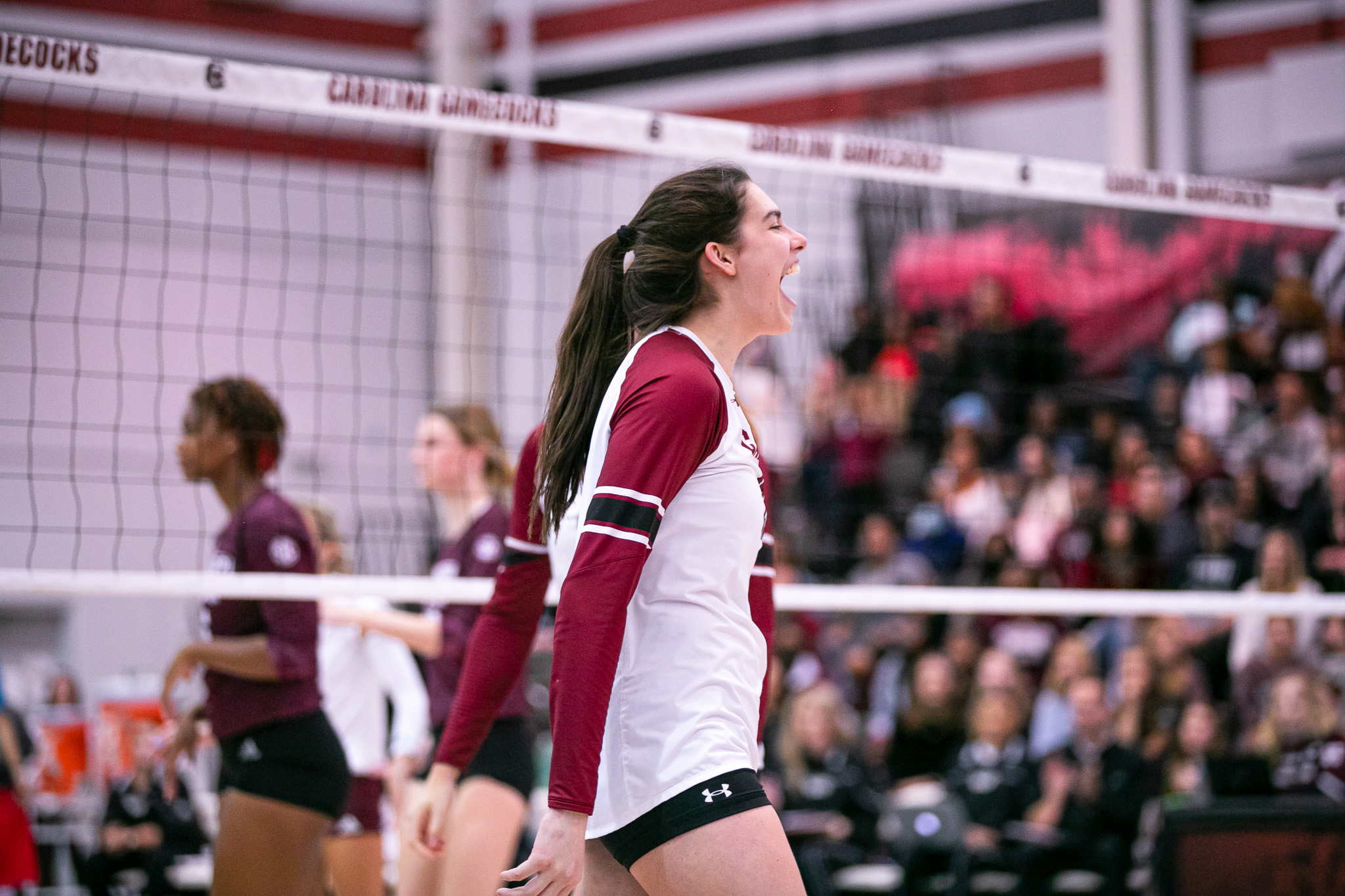Aug. 10, 2007
COLUMBIA, S.C. — The South Carolina volleyball team concluded its fourth day of practice for the 2007 season Friday. The Gamecocks open the year Friday, Aug. 24, in Newark, Del., at the Delaware/Asics Invitational against Binghamton. Read on for a general outlook on the upcoming season.
GENERAL OUTLOOK
The South Carolina volleyball program has a new but familiar face leading its program this season. Ben Somera officially took over as head coach of the Gamecocks in late June 2007 after his wife, Nancy, decided to step aside to pursue a business venture. After spending six years at Oregon State, the Someras came to Columbia, S.C., in February 2005 with Ben serving as associate head coach during the 2005 and 2006 seasons.
As a first-year head coach, Somera has an advantage in already knowing his players’ strengths and weaknesses, as well as being able to continue the development of a system of volleyball installed when he first arrived over two years ago. Still, when one becomes a head coach for the first time there are new roles and responsibilities that must be undertaken, and Somera is quick to recognize that fact.
“The biggest difference from before is that I used to work pretty autonomously in certain aspects, but now I’m responsible for every part of the program and have to delegate responsibilities,” Somera said. “I’m excited about the opportunity. Everybody’s in a new role, but the personalities and relationships are still intact. The players haven’t treated me in a different way, but now I talk to them about different things. We’re continuing to build on things that have already been established and then are adding a little more. Really, it’s year three for us.”
South Carolina’s volleyball program is hoping to return to the success it enjoyed from 1995 to 2002. During that time frame, the Gamecocks made six NCAA Tournament appearances in eight years and reached the second round of the event on four occasions. Carolina compiled a 163-70 (.700) overall record in those eight seasons and went 81-33 (.711) in regular-season SEC contests. Since its last NCAA bid in 2002, South Carolina has been unable to post a winning record.
The Gamecocks made progress in 2006, however, and showed they were capable of competing with any team in the SEC. A statement was made by South Carolina when it defeated then-No. 6 Florida in September, the program’s first win over the Gators since 1994. It ended up being Florida’s only SEC loss and remains just its fifth regular-season conference loss since 1991.
After hitting some stumbling blocks in October and early November, South Carolina made more in-roads with the SEC by defeating Kentucky and Tennessee. The Gamecocks had not beaten the Wildcats since 2003 prior to their 3-2 victory, and the win versus the Lady Volunteers snapped a seven-match losing streak to UT. Including Florida, Kentucky, Tennessee and Mississippi, South Carolina notched four triumphs against teams making the 2006 NCAA Tournament field.
With plenty of bright spots from the prior season, the Gamecocks’ goals still begin simple and then become more aggressive. The obvious place to start is by ending a string of four straight losing records.
“We have to have an overall winning record; that’s the first step,” Somera said. “We have to take care of our preseason record and come into the SEC and aim for a .500 record in league play. The NCAA Tournament is the second step. We want a tradition of making the tournament and eventually contending for the SEC title. With no seniors this year, we could be in a good position for the next two years as well.”
In order to achieve any of their goals, the Gamecocks will need to show improvement in not just their ability to play offense and defense but in toughness as well. South Carolina went 4-5 in four-game matches last year and did likewise in five-gamers. After the 2005 campaign, the phrase “get comfortable with the uncomfortable” was a recurring theme throughout spring practice and was emphasized once again this past off-season.
“Toughness as a unit is something we addressed in the off-season,” Somera said. “Any time we got in those tight situations, we had trust issues among the players that weren’t fully resolved. People had to do too much last year and it affected our confidence. In the spring and winter, we tried to develop trust in a different way by building it player-to-player through doubles. In general, everybody has a little more respect for how people go about their business now.”
South Carolina also intensified its strength and conditioning program to push the Gamecocks to the edge of their comfort level. The change is expected to pay dividends this year in long matches with players not becoming fatigued as easily.
The Gamecocks will field a very young team this season and have no seniors and just three juniors. Eight true freshmen are listed on the roster, along with one redshirt freshman and a quartet of sophomores. Given the experience of Carolina’s 16-person roster, success will be greatly determined by the performance of its newcomers and the leadership of its upperclassmen.
“The pros of having a young team are everybody comes in wide-eyed and bushy-tailed, and there’s a different level of excitement,” Somera said. “The cons are obviously that they have not played at the collegiate level, and everything will be new with volleyball in the SEC and traveling. It takes a while to adjust, but I like what we have and our volleyball IQs. It’ll be a jump for the freshmen, but I think they’ll manage it really well.”
A member of the junior class would be an obvious choice for the role of team captain, but it remains to be seen who that person will be. While all three have been leaders in some way, not one appears ready to shoulder all the responsibility. It is possible the Gamecocks may have multiple captains, and they may not all be from the junior class. Somera plans to announce his captain or captains prior to the first week of competition in order to let every member of the team voice her opinion in the decision.
South Carolina certainly faces a challenging schedule once again with its membership in the Southeastern Conference. Nine non-conference matches among three tournaments should push the team and help identify weaknesses that can be corrected in time for the Gamecocks’ 20 SEC contests. Last season, the SEC set a record by sending seven of its 11 teams (Vanderbilt does not sponsor volleyball) to the NCAA Tournament, eclipsing the standard of six established the year prior.
A change Somera made this season that should help South Carolina is the elimination of mid-week matches against non-conference teams, which allows for a consistent training schedule. Two contests against Florida are set to happen on a Wednesday, but they are the only ones not scheduled for a Friday, Saturday or Sunday.
Winning on the road is one of the most consistent features of a good team, and the Gamecocks will have plenty of opportunities early in the conference season. After opening with two home matches, eight of their next 10 SEC contests take place on the opposition’s home court. The benefit of how Carolina’s schedule sets up is the Gamecocks end their season with six of their final eight matches in Columbia, giving them a great opportunity for a strong finish to impress the NCAA Selection Committee.












